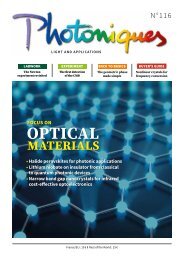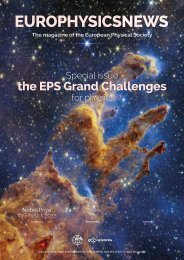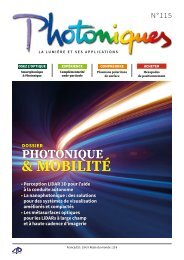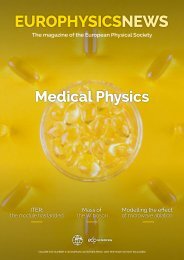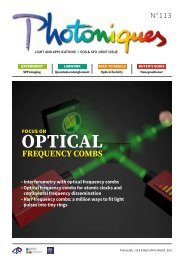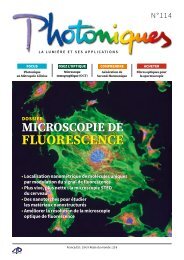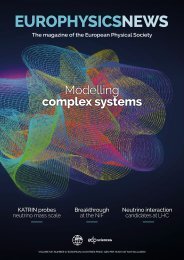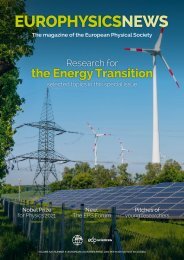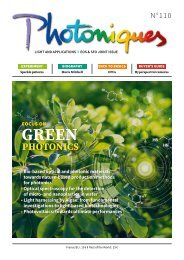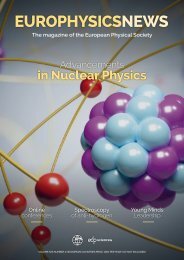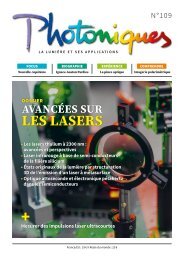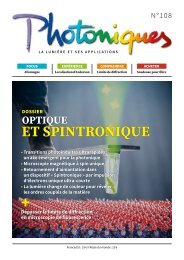Europhysics News 53-4
Europhysics News Quantum Issue
Europhysics News Quantum Issue
Create successful ePaper yourself
Turn your PDF publications into a flip-book with our unique Google optimized e-Paper software.
FEATURES<br />
war in Ukraine<br />
m A neutron source<br />
substation at Kharkiv<br />
Institute of Physics<br />
and Technology<br />
destroyed by Russian<br />
attacks on 6 March,<br />
2022. © State<br />
Nuclear Regulatory<br />
Inspectorate<br />
of Ukraine.<br />
22 EPN <strong>53</strong>/4<br />
The war in Ukraine is going on. The number of its<br />
victims is increasing every day. A significant number of<br />
scientists are called to the ranks of the Armed Forces or<br />
are involved in territorial defense units. Thousands of<br />
them work as volunteers and do their best to help financially,<br />
facilitate the placement of temporarily displaced<br />
persons, or help the military in other ways. Note that<br />
due to the peculiarities of wartime, women, the elderly<br />
and children dominate among temporary refugees to<br />
other countries of the world, while men under sixty<br />
remain in Ukraine and form a mobilization reserve.<br />
Considerable attention is paid in Ukraine to the preservation<br />
of the infrastructure of scientific institutions,<br />
primarily in terms of the implementation of urgent<br />
works to save damaged buildings and their temporary<br />
conservation until the end of hostilities. In most physical<br />
laboratories, research work continues, although for<br />
obvious reasons, in volumes smaller than before the<br />
war. The first attempts to analyze the impact of the war<br />
on scientific research in Ukraine have already appeared<br />
[7]. Is it possible to talk about the future of physics in<br />
Ukraine under such conditions? In our deep conviction,<br />
it is not only possible, but also necessary.<br />
In the long term, Ukrainian science evidently would<br />
require a “Marshall Plan” to survive. We may hope to<br />
get easier access to European research infrastructures<br />
and the international grants like within Horizon Europe,<br />
but development of joint research labs and institutes in<br />
Ukraine would be especially helpful. One of the key tasks<br />
will be not just to restore the pre-war level of scientific<br />
infrastructure, but to create new points of rapid growth<br />
- possibly through the creation of a few centers of interdisciplinary<br />
basic research with modern equipment as<br />
well as with the access to global computer facilities and<br />
the wide involvement of international specialists in research<br />
topics. These centers should be closely integrated<br />
into the educational process. It could give a powerful<br />
stimulus both for the training of young physicists and<br />
for maintaining the level of basic research with the integration<br />
into the European Research Area.<br />
Some forms of help to Ukrainian scientists and students<br />
emerged immediately with the rise of the war. We<br />
have got a number of offers from colleagues around the<br />
world to host Ukrainian scientists. Examples are PAUSE<br />
and JESH programs in France and Austria and many others<br />
[8]. In places with long lasting collaborations the special<br />
programs have been started. For example, the Ukraine<br />
Scientific Scholarship Program has been promptly established<br />
in Dresden, and in the first month 19 students<br />
and scientists, mostly physicists, have gone to the Leibniz<br />
Institute for Solid State and Materials Research Dresden<br />
to continue their research [9]. Such scholarships remain<br />
attractive also in the middle term, when it is about establishing<br />
new collaborations. Although there is a danger<br />
of a new wave of “brain drain”. Other positive examples<br />
of foreign help to Ukrainian researchers or students<br />
staying in Ukraine are the IRIS-HEP Ukrainians Fellows<br />
program or the Pauli Ukraine Project [10]. The remote<br />
projects seem to be indispensable to support Ukraine<br />
and its researchers and lecturers in the middle time scale.<br />
In the current situation, it also increases the importance<br />
of PhD studies carried out in frames of the splitside<br />
agreements (co-tutelle). To give an example, the first<br />
co-tutelle PhD thesis in the field of physics was defended<br />
in 2008 within collaboration between the University of<br />
Lorraine (then – Henri Poincaré University Nancy) in<br />
France and ICMP in Lviv. Now this collaboration is widened<br />
to the International Doctoral College “Statistical<br />
Physics of Complex Systems” that joins ICMP with<br />
Universities of Lorraine, Leipzig and Coventry. We think<br />
that such and similar initiatives have to be further supported<br />
both by the local decisions of University councils<br />
as well as on the level of international programs.<br />
As sociological studies show, the vast majority of<br />
Ukrainians are convinced of the victory of Ukraine, despite<br />
the terrible methods of waging war (methods that have<br />
been recognized globally as terrorist in essence), when<br />
the Russians try to intimidate and in this way subjugate<br />
through the total destruction of civilian infrastructure objects<br />
and bombing of peaceful residents. But the victory<br />
(as Ukraine imagines victory) is possible only when the<br />
international community helps Ukraine to endure. This<br />
is the way to lasting peace in Europe and the world, this<br />
is the way for peace in Ukraine and this is the way when<br />
physics (like other sciences) will have a future in Ukraine.<br />
And every citizen of the world can contribute to this process,<br />
or be a passive observer, and therefore an active opponent<br />
of such a scenario. This is an answer without guile<br />
to the question about the future of physics in Ukraine. n<br />
About the Authors<br />
Yurij Holovatch is a chief researcher<br />
at the Institute for Condensed Matter<br />
Physics of the National Academy of<br />
Sciences of Ukraine and a full member<br />
of the Academy. PhD (1984) and<br />
DSc (1991) in theoretical physics. He



